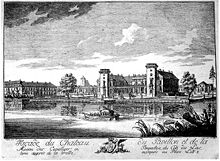Johann Gottlieb Janitsch
Johann Gottlieb Janitsch (born June 19, 1708 in Schweidnitz , Duchy of Schweidnitz ; buried on April 3, 1762 in Berlin ) was a German composer .
Life
Johann Gottlieb Janitsch, who came from a middle-class family, received his first musical training at the Latin school in his hometown, the Dreifaltigkeitsschule. In nearby Breslau he was able to expand his musical knowledge with musicians from the Kurmainzer Hofkapelle, which was present there. At his father's request, he studied law at the University of Frankfurt an der Oder from 1729 to 1733. Here he received his first orders to write serenades and festival music. In 1733 he became secretary of the Minister of War Franz Wilhelm von Happe (1684-1760). From 1736 Janitsch was a chamber musician with Crown Prince Friedrich in Rheinsberg Castle . Here, with the permission of the Crown Prince, he organized the so-called “Friday Academies”, in which the bourgeoisie also enjoyed works by the court orchestra. As one of the “first servants of the capell” of the newly founded Berlin court orchestra, he was a contraviolonist from 1740 with a salary of 350 thalers. In Berlin he continued the Rheinsberg concert tradition in the form of a weekly concert, at which royal, princely, margravial chamber and other skillful private musicians and lovers made music in public. This music association was the first in a series of similar organizations that emerged in Berlin after 1750. Janitsch thus set the beginning of the detachment from courtly to civic concert events.
In 1749 Janitsch married Johanna Henriette Eymer, adoptive daughter of the court councilor and mayor Albrecht Emil Nicolai.
Janitsch's works correspond to the gallant and sensitive style of the first half of the 18th century. Until the 1740s he composed mainly four-movement trio sonatas in the form of the Sonata da Chiesa (slow-fast-slow-fast), from 1750 almost exclusively three-movement works in the form of quartets (3 upper voices and b.c. ) in differently composed strings. and wind instruments. Many works were already printed by Breitkopf during Janitsch's lifetime. Numerous manuscripts by Janitsch have been returned to the archive of the Sing-Akademie zu Berlin after they were returned in 1999 by the Kiev Conservatory .
The composer Johann Wilhelm Hertel said, 21 years after Janitsch's death: "He was a good contrapuntist and his quartets are still the best examples of their kind at the moment".
Works (selection)
vocal
- Cantata " Che debbo rimirar "
- Funeral music for Professor Samuel Strimesius , 1730
- Funeral music for Minister of State Knyphausen, 1731
- Evening music for Rector Professor Heinecius, around 1731
- Wedding cantata for the Margrave of Bayreuth with Princess Wilhelmine of Prussia, 1731
- Te Deum, for laying the foundation stone of the Catholic Sankt Hedwigs Church in Berlin (1747)
- 3 Serenades, Frankfurt an der Oder (November 14, 1729, December 26, 1731, March 1732)
- A coronation music for Friedrich Adolf of Sweden was assigned to Janitsch for a long time; an autograph by Johan Helmich Roman is now available.
Instrumental
- Op. 1: 3 Sonata da Camera a quattro Stromenti (Berlin, 1760)
- Overture for 2 flutes, strings and B. c.
- Op. 3: Sonata da Camera in B flat major for recorder, two oboes and B. c.
- Numerous symphonies, mostly for strings and bc, some with 2 horns.
- About 35 church and chamber sonatas ( trio sonatas ) for two melodic instruments and B. c. remained.
- Another 40 Sonata da Chiesa and da Camera (quartet sonatas) for three melodic instruments and B. c. remained.
- Some works for piano and organ.
literature
- Thomas-M. Langner: Janitsch, Johann Gottlieb. In: New German Biography (NDB). Volume 10, Duncker & Humblot, Berlin 1974, ISBN 3-428-00191-5 , p. 333 f. ( Digitized version ).
Web links
- Works by and about Johann Gottlieb Janitsch in the catalog of the German National Library
- Sheet music and audio files by Johann Gottlieb Janitsch in the International Music Score Library Project
Individual evidence
- ↑ Thomas-M. Langner: Janitsch, Johann Gottlieb. In: New German Biography (NDB). Volume 10, Duncker & Humblot, Berlin 1974, ISBN 3-428-00191-5 , p. 333 f. ( Digitized version ).
- ^ The New Grove Grove Dictionary of Music and Musicians , 2nd edition
| personal data | |
|---|---|
| SURNAME | Janitsch, Johann Gottlieb |
| BRIEF DESCRIPTION | German composer |
| DATE OF BIRTH | June 19, 1708 |
| PLACE OF BIRTH | Schweidnitz |
| DATE OF DEATH | buried April 3, 1762 |
| Place of death | Berlin |
